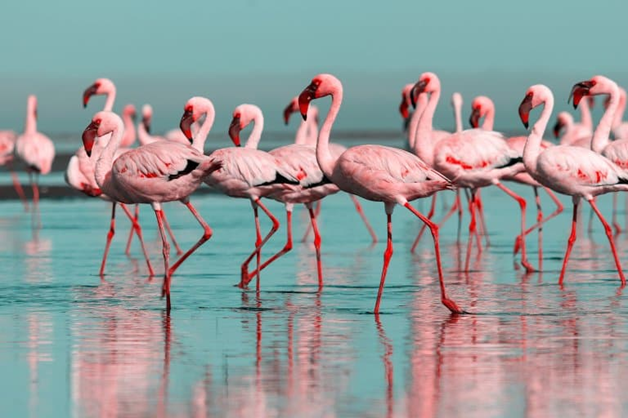International Flamingo Day, April 26: A few Facts
- Shankar Chatterjee
- Apr 25, 2024
- 2 min read
Updated: Dec 26, 2024
The flamingo (Phoenicopterus) is one of the most recognized birds in the world. These birds are found in tropical areas and have S-curved necks, attractive colours, slender legs, and wide wingspans. They generally collect food from the water and consume items like shrimp and insect larvae. There are six flamingo species, four in the USA and South America and two in Africa, Asia, and Europe. The tallest, the greater flamingo, can reach nearly 5 feet, while the lesser flamingo is only around 2.5 feet tall. Flamingos eat with their bills upside down. Their bills are specially adapted to separate mud and sand for their food, so they eat with their heads upside down in the water. This might seem backward, but their bills are more effective this way. Tiny openings at the top help filter the water, while their tongue helps pump water in and out to trap food.
No flamingo species are currently classified as endangered. However, their numbers have recently declined, and the Andean flamingo is classified as vulnerable by the ICUN. The lesser flamingo, Chilean flamingo, and James’s flamingo are all near threatened.
Global warming, habitat destruction, and food deficiencies are impacting populations around the globe. When flamingo chicks are born, they are grey or white in colour. They will gradually develop colour in the first few years (factanimal.com/flamingo).
International Flamingo Day (IFD) was started in 2020 by the Flamingo Specialist Group of the International Union for Conservation of Nature ( IUCN)and is hosted on April 26, the birthday of John James Audubon, the famous American painter and ornithologist who produced a remarkable and eye-catching life-sized picture of the American (Caribbean) flamingo for the now iconic book The Birds of America.
The objective of the day’s creation was to raise awareness for protecting flamingos and their natural habitats and promote a greater understanding of the birds and their challenges. The idea is that having at least one day each year in which flamingos have this special designation promotes discussions on and education about the bird, which could have a knock-on effect for generations to come.
The zoos and other wildlife associations hopped on board quickly after the day’s announcement. Even though the first International Flamingo Day fell in the early months of the pandemic, zoos worldwide did what they could to support the fabulous birds (thepopularflamingo.com).
A long ago, our saints mentioned that Vasudeva Kutumbakam/ Vasudhaiva Kutumbakam means “the world is one family.”
Prof Shankar Chatterjee, Hyderabad
International Flamingo Day, April 26: A few Facts





Comments